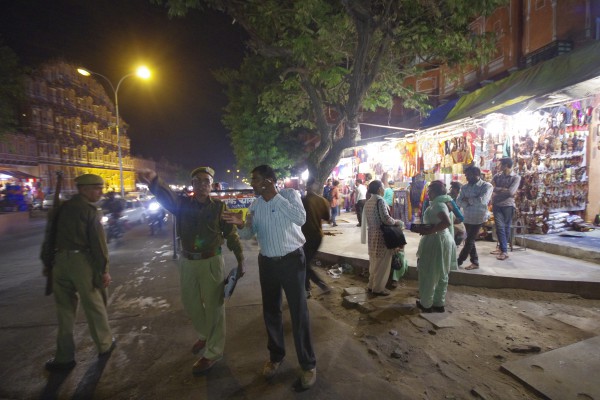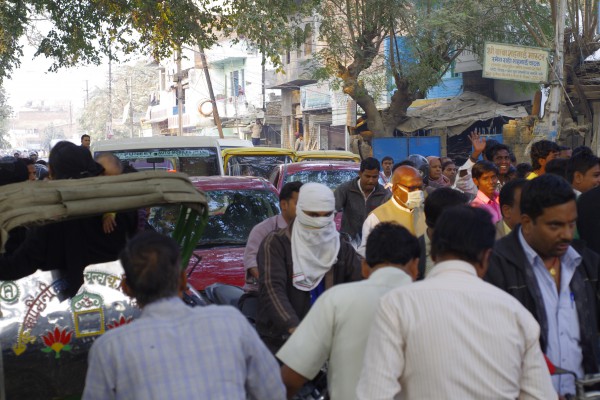
For every stay in a hotel, our passports were copied and we had to pose for a photo. Travelling on a train was not possible without giving the passport number either, and that’s nothing compared to the masses of data we were asked for when applying for a visa or buying a SIM card. To enter a railway or subway station, we had to have your luggage scanned and walk through a metal detector. CCTV cameras are a regular feature of the urban environment.
A very large Democracy
I spoke to Indian people who expressed pride of being in the world’s largest democracy (by population size). When I responded that this amount of surveillance makes democracy a farce, they only shrugged their shoulders. To coordinate this vast number of people, they said, there have to be restrictions, and they considered it a much larger challenge to provide security in this country with all its poverty, compared to wealthy Europe. Living in conflict with the neighbouring state of Pakistan and experiencing very real attacks on the population and also on tourists has deeply embedded itself in the Indian mind. And I caught myself thinking with a kind of double standard as well. Maybe, after all, this is not so wrong for this country? Can’t I actually consider myself a bit more safe with this government’s pervasive surveillance? My journey to India made me realise why these arguments work so well in Germany, too. But in that airport, the surveillance clearly did not increase my personal security. You do not really want to travel on your own as a woman in chauvinist India. The exclusively male staff at the airport did not hesitate to demonstrate their power to me as a single female traveller, and to try shaming me. If my male travelling companion is not allowed to enter the airport for security reasons, it subjects me to additional and palpable insecurity. And I don’t even want to think what an evil-minded person could have done with that list of plane passengers.
There was one thought that calmed me though. Most data registration was still done in an analogue way, using pen and paper. The imperfections of Indian organisation led me to believe that data would not be connected very efficiently – although it was clear that this would only be a matter of time. At the 30th Chaos Communication Congress (30C3) in late December 2013, I learned that the amount of data that is already digitally registered and connected is much larger than I had feared. India shows us today what our own future could look like – if we were to give up the fight against surveillance as a lost cause.
At 30C3, two talks on India offer insights
I would like to recommend two 30C3 talks about this issue. Maria Xynou describes a horror scenario come true:
But Xyrou and Srikanth are still optimistic. While more and more people here are throwing in the towel, they are both are convinced that they can change things for the better, even though the situation seems much less hopeful in India. And Srikanth explains why: there has been a large protest movement against corruption in India in recent years, and it has achieved a lot. That is his ambition with respect to privacy as well. At the “Freedom Not Fear” (“Freiheit statt Angst”) rally in Berlin last autumn, he saw how it was possible to get thousands of people onto the streets protesting about these issues. That gave him a lot of courage.
Data Protection Wonderland
Compared to other countries, we in Germany live in a data protection wonderland. In the meantime, as much as a sixth of the world’s population is being attuned to the thought that surveillance is completely normal and a necessary evil. While we are debating data retention, facts are being created over there that are much more horrendous. And India is not the only populous surveillance state. If we add China to the picture (as discussed in another 30C3 talk), we have as much as a third of humanity being constantly spied on and brought to heel.

Our resistance is not only helping us. It has a signal effect abroad as well – for politicians and also for people who are fighting against a much larger goliath. When Srikanth points out at the end of his talk how important the Berlin “Freiheit statt Angst” rally was for him, it sends a clear message to me: while we in the German “movement” quarrel about the event’s date, we forget what is really important. The important thing is that the rally goes ahead and that we send a signal with it beyond the German border. No squabbling about details and no pessimism must be allowed to stop that.
Encourage and Succeed
If we restrict our focus to the inside of our “Fortress Europe”, we will not get very far in the long term, faced with this overpowering belief in surveillance. Because it is not just us who have an effect on the outside world. The outside affects us, too. (Many producers of surveillance technology are companies from India.) We must not forget to ask how we can support people outside of Germany and outside of Europe, and we need to become aware of the role model effect that we can have. Because then we can encourage each other, and succeed.
rop.gonggri.jp: Surveillance: NOT a first world problem
Translation: Sebastian Lisken, Digitalcourage
